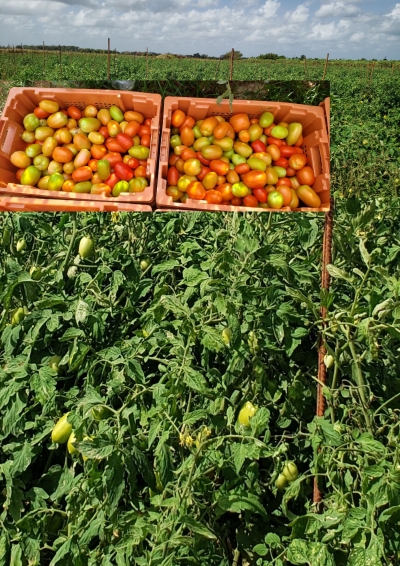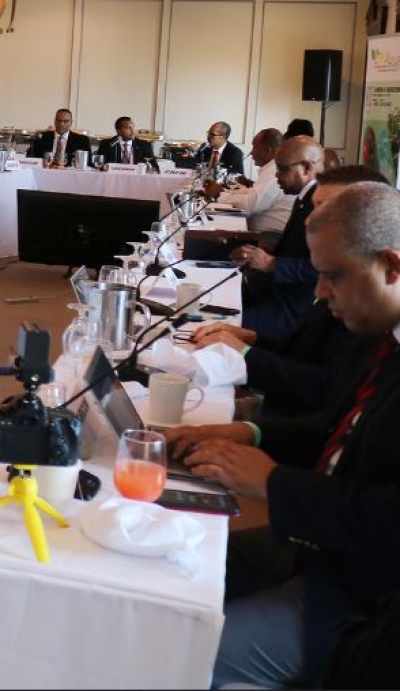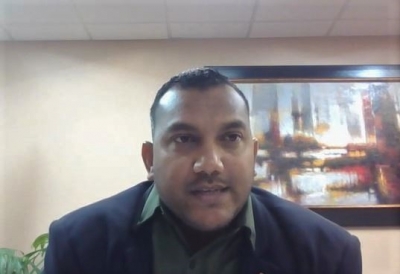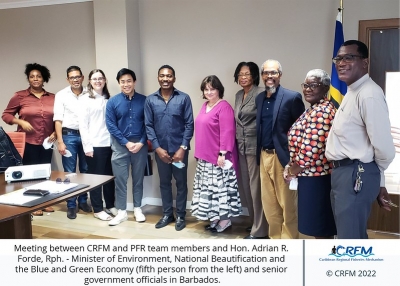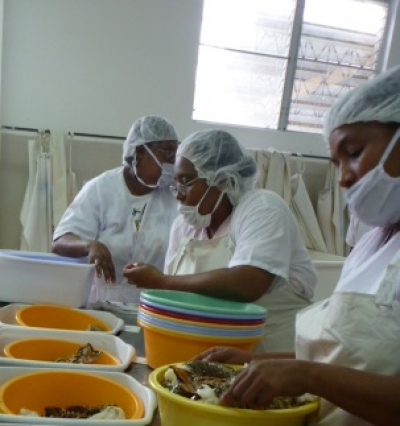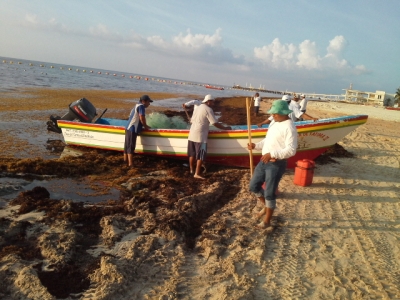PFR-CRFM to showcase innovative work on Sargassum-derived plant-growth bio-stimulant at upcoming Caribbean Week of Agriculture
Belize City, Friday, 4 October 2024 (CRFM)—The innovative work being done under the New Zealand-funded Sargassum Products for Climate Resilience Project, to develop a plant growth enhancer or bio-stimulant from Sargassum, will be showcased during the upcoming Caribbean Week of Agriculture, to be held in Saint Vincent and the Grenadines. The work being done under the project by the Caribbean Regional Fisheries Mechanism and the New Zealand Institute for Plant and Food Research (Plant & Food Research) fits well within the event theme, Climate Smart Agriculture for a Sustainable Future.
Mr. Milton Haughton, Executive Director, Caribbean Regional Fisheries Mechanism Secretariat, said that: “The Sargassum Products for Climate Resilience Project has the potential to make a substantial impact towards the attainment of the CARICOM vision to reduce the region’s food import bill by 25% by 2025 (called ‘Vision 25 by 2025’). This is because a Sargassum-derived fertilizer produced within the Caribbean could ease the financial burden caused by the increasing costs for imported fertilizers. This, in turn, could boost agricultural production for farmers and producers by making their operations more cost-effective.
Haughton added that, “Using Sargassum in this way mitigates the impacts of the inundations, which include the release of methane—a powerful greenhouse gas which is emitted as the Sargassum decomposes in coastal waters. The Sargassum Products for Climate Resilience Project, therefore, helps the Caribbean to adapt and build resilience to climate change, which is one of the key factors fueling the Sargassum blooms.”
The CRFM and Plant & Food Research (PFR) are working together to mitigate the environmental and economic impacts of Sargassum influxes in affected Caribbean countries through the creation of inclusive value chains for Sargassum.
Mrs. Sophie Jones-Williams, Program Manager - International Development, Plant & Food Research, New Zealand, said: "Together with our partners in the Caribbean, we have worked hard to test the efficacy and safety of the bio-stimulant we are developing from Sargassum. Our trials and thorough testing for heavy metal contamination, has ensured confidence that the product we are developing will not only bring benefits through increased yields but also healthy, more resilient production systems."
Since its inception in 2020, the project has ensured that regional partners are involved in this initiative. The CRFM and PFR have been working in collaboration with researchers at the University of the West Indies (Cave Hill Campus in Barbados and Mona Campus in Jamaica) and the University of Belize; the Governments of Barbados, Belize, and Jamaica; as well as the Caribbean Agricultural Research and Development Institute (CARDI), the Instituto Tecnológico de Santo Domingo (INTEC) of the Dominican Republic, and the private sector, to ensure that the project taps into the best expertise available in the region.
Based on the successful outcome of prior scientific studies and greenhouse trials for a Sargassum-derived liquid bio-stimulant, the partners commenced field trials earlier this year. In August 2024, the Ministry of Agriculture, Food and Nutritional Security of Barbados, in partnership with the Ministry of Environment and National Beautification, Green and Blue Economy, hosted a Sargassum Liquid Extract Field Day to showcase the progress being made with growing cucumbers using the Sargassum-derived bio-stimulant in ongoing field trials.
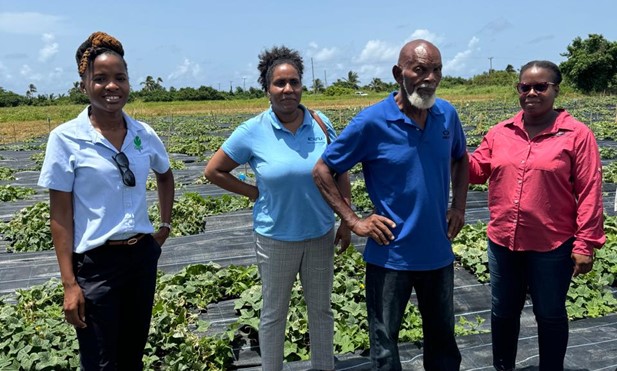
Representatives of the Caribbean Regional Fisheries Mechanism (CRFM) and the Caribbean Agricultural Research and Development Institute (CARDI) recently visited a farm in Barbados where the bio-stimulant is being tested on plots of vegetables (Photo: CRFM Secretariat).
The CRFM and PFR are also working to engage institutional and private sector partners to commercialize and upscale production, based on the successful outcome of the testing and trial phases which are due to conclude by year-end.
During the upcoming Caribbean Week of Agriculture (CWA), the CRFM and PFR will partner to host the Sargassum Seminar on Supporting Climate-Smart Fisheries, Aquaculture, and Agriculture through Product Innovation. The purpose of this hybrid event—to be held on Wednesday, 9 October 2024, at 9:00 a.m. to 10:30 a.m. Atlantic Standard Time (AST), at University of West Indies, Open Campus, Kingstown, Saint Vincent and the Grenadines and online—is to showcase the innovative work being done to develop a fertilizer and compost from Sargassum seaweed using the principles of the circular economy and the precautionary approach, to ensure safety across the value chain.
In addition to Haughton of the CRFM and Jones-Williams of PFR, other event speakers include: David Mogollon - EU Head of Cooperation to Barbados, Trinidad and Tobago, the Eastern Caribbean States, the OECS and CARICOM/CARIFORUM; Dr. Maren Headley - Programme Manager, Fisheries Management and Development, CRFM Secretariat; and Chadeene Beckles - Value Chain and Marketing Specialist, Caribbean Agricultural Research and Development Institute (CARDI).
This seminar is one of two events to be hosted by the CRFM and its partners during the upcoming Caribbean Week of Agriculture, with a focus on the theme, Promoting Climate-Smart and Resilient Fisheries and Aquaculture for Food Sovereignty & Food Security, and a Sustainable & Profitable Future. The CRFM will also host the Caribbean Small Scale Fisheries & Aquaculture Forum on Tuesday, 8 October 2024, at 1:30 p.m. to 5:30 p.m. Atlantic Standard Time (AST), at the same venue. This Forum will provide a space for small-scale fishers to engage with CRFM, Member States representatives, other stakeholders, and partners on matters of key importance to the sector, surrounding the central themes of climate change, food security, and sustainable livelihoods.
The CRFM and PFR will also showcase the project at the CWA Tradeshow and Expo, which will be held at the Kingstown Cruiseship Terminal from 7 – 11 October 2024..
– ENDS –
Link to register for the event:
https://forms.gle/VAEEYJ6DPw6rwVjF7
Link to access the project brochure:
https://drive.google.com/file/d/1VkXyskYUmdovkmWaZlKgSALwom409IeW/view
Link to project webpage:
https://crfm.int/index.php?option=com_k2&view=item&layout=item&id=792&Itemid=499
Field trials on the horizon for Sargassum-derived fertilizer
Belize City, Friday, 12 April 2024 (CRFM)—A multi-country mission to monitor progress with the regional Sargassum Products for Climate Resilience Project, funded by the New Zealand Ministry of Foreign Affairs and Trade, has recently concluded. Representatives from the Caribbean Regional Fisheries Mechanism (CRFM) and the New Zealand Institute for Plant and Food Research Limited (PFR) met with key partners in Barbados, Trinidad and Tobago, and Jamaica in February and March 2024, to review progress and plan future activities. Based on the successful outcome of recent scientific studies and greenhouse trials for a Sargassum-derived liquid fertilizer, the partners will commence field trials within the next few weeks. These efforts, which will be advanced in collaboration with the Caribbean Agricultural Research and Development Institute (CARDI) and regional private sector partners, signal promising progress towards valorization of Sargassum and strengthening the Caribbean’s food security and climate resilience.
“Since the COVID-19 pandemic, the cost of fertilizers has skyrocketed, and farmers across the region need more affordable, high-quality fertilizers to improve their yields, especially in the stressful environment brought about by warmer temperatures and drought conditions. Anything that we can do to improve the supply and reduce costs and dependence on imports will be impactful,” Milton Haughton, Executive Director, CRFM Secretariat, stated.
“The project is working with multiple reputable research organizations to ensure a strong evidenced-based approach to the product development process. We understand the complex nature of the Sargassum issue and concerns in the agricultural sector and are prioritizing human, environmental and plant health in our research and development,” Sophie Jones-Williams, PFR’s Program Manager - International Development, said.
“We are excited about the positive results achieved thus far towards developing a safe and effective liquid fertilizer for the agriculture sector, and the potential for scaling out for wider impact across the Caribbean. Efforts to optimize the fertilizer production process, based on the greenhouse trials, are underway. The CRFM and PFR are working in collaboration with researchers at the University of the West Indies, Cave Hill Campus in Barbados, as well as CARDI and the private sector, to ensure that the project taps into the best expertise available in the region. Sargassum is a versatile, natural, renewable marine living resource that, if harvested and used safely and sustainably, could birth new economic opportunities for fishers and coastal communities, as well as entrepreneurs across the region, contributing to the realization of the vision of blue economic growth,” Haughton added.
The project's two main guiding principles are the circular economy approach, which ensures total utilization of the Sargassum, including conversion of the residue or waste into other products; and the precautionary principle, which ensures that adequate caution is taken when there is uncertainty and a risk of harm.
This is in keeping with the overall aim of the Sargassum Products for Climate Resilience Project, to mitigate the environmental and economic impacts of Sargassum influxes in affected Caribbean countries through the creation of inclusive value chains for Sargassum seaweed. Since the inception of the project in 2020, the CRFM and PFR have been working diligently to develop safe harvesting and handling techniques. They have been rigorously testing to ensure safety from hazardous heavy metals throughout the process of product development, all along the value chain—from harvesting through to pilot scale production, as well as greenhouse trials that utilized the prototype product to grow vegetables. This effort builds upon the CRFM’s prior work, since 2015, to address the persistent problem of recurring Sargassum inundations which have been plaguing the region for the past 13 years.
The region has been seeing high levels of Sargassum inundations almost every year since 2011, and this regional project focuses on developing processes by which the Sargassum can be transformed from a bane to blessing for the Caribbean economy, using science, technology, and evidence-based decision-making to produce safe and viable commercial products. Although the Caribbean Sea continued to be largely free of Sargassum since the beginning of 2024, the eastern Caribbean Sea is starting to receive large quantities of Sargassum from the central Atlantic, and this trend is likely to continue with increasing inundation of the coastal waters and beaches of several CRFM countries during the coming months.
The final phase of the PFR-CRFM Sargassum Products for Climate Resilience Project will focus on outreach and supply chain development, which would entail the dissemination of a workable model to Caribbean industry stakeholders.
– ENDS –
CRFM and PFR of New Zealand developing innovative products from Sargassum

Greenhouse trial with liquid organic fertilizer derived from Sargassum (Photo: M. Haughton, CRFM)
Belize City, Thursday, 7 December 2023 (CRFM)—Groundbreaking work has begun in the Caribbean to produce Sargassum-derived liquid fertilizers or plant growth promoters, as well as an organic compost from processed Sargassum, for eventual incorporation into farmer and grower practices in the Caribbean. The Caribbean Regional Fisheries Mechanism (CRFM), an inter-governmental organization of the Caribbean Community (CARICOM), and Plant & Food Research, a New Zealand Crown Research Institute, are leading this initiative, under the Sargassum Products for Climate Resilience in the Caribbean Project, a multiyear project funded by the New Zealand Ministry of Foreign Affairs and Trade.
This builds on work undertaken by the CRFM since 2015, to address the persistent problem of recurring Sargassum inundations which have been plaguing the region for the past 12 years. Sargassum blooms continue to adversely affect the coastal ecosystems and economic sectors—such as fisheries and tourism—in many Caribbean countries, and clean-up efforts have been costly. Although Sargassum levels have fluctuated from year to year, the general forecast is for continued high levels of blooms and beaching of Sargassum in the foreseeable future. Climate change and nutrient enrichment of the oceans have been identified as major contributing factors to this phenomenon which has been affecting our region since 2011.

Sargassum inundation across a fishing beach on the island of Saint Lucia (Photo: M. Haughton, CRFM)
“Sargassum is a natural marine living resource that has been abundant in our coastal waters. It is often an unpleasant sight on our otherwise picturesque beaches, and rotting Sargassum heaps are hazardous to humans and marine life and environmental health. We must, therefore, find ways to use the Sargassum while neutralizing any potential negative effects of the heavy metals contained therein. The safe and profitable conversion of Sargassum biomass into innovative products to adapt to climate change and bolster economic resilience will also generate tangible economic and social benefits for local communities and present and future generations across the entire Caribbean,” said Milton Haughton, Executive Director of the CRFM.
The first phase of the project, which focused on testing the Sargassum to better understand how to handle and use it safely, was completed in 2022. This second phase, which commenced early 2023, focuses on product and process development. In May 2023, the CRFM concluded agreements with the University of the West Indies (UWI), Department of Biological and Chemical Sciences, Cave Hill Campus, and the Caribbean Agricultural Research and Development Institute (CARDI), which are providing technical support for joint research and surveys to advance the second phase of the project. During this phase, the project will develop and evaluate liquid fertilizers and compost from Sargassum. The hope is that this initiative will help to protect the marine environment and coastal communities, and create jobs and value-added products, while contributing towards the reduction of the region’s high import bill for fertilizers used by farmers.
There are two very important guiding principles of this project. The first is the application of the precautionary principle which ensures that when there is uncertainty and a risk of harm, we should act with care and caution, guided by the best available scientific information. The second principle encompasses the circular economy approach, which ensures total utilization of the Sargassum to eliminate waste and pollution, which is good for people, business, and the environment. The Sargassum harvested from the sea will, therefore, be used to produce fertilizer, and the residue will be utilized to generate other products such as compost and building materials—all of which will be safe and effective for their intended purposes.
UWI has assisted with the process of producing liquid fertilizers from the Sargassum. CARDI has been conducting a survey of farmers to engender a deeper understanding of how they use fertilizers and their interest in a fertilizer product from Sargassum. This knowledge will enhance strategies to promote the uptake of the Sargassum-derived products for use in the agriculture sector.
CARDI is now completing a study to evaluate the performance of the liquid fertilizers developed with the assistance of UWI on crops under greenhouse conditions. Further studies will be conducted in the field with the assistance of farmers.
Since the commencement of the Sargassum Products for Climate Resilience Project in 2020, the CRFM and Plant & Food Research of New Zealand have worked with partners in Barbados, Belize, Jamaica, and the Dominican Republic, and with specialized laboratories in the United States and New Zealand, to conduct Sargassum raw material safety testing and to review potential products that could be made from the Sargassum.
The final phase of the project, which is due to commence in 2024, will focus on the establishment of a pilot plant to produce liquid organic fertilizer, as well as on outreach and supply chain development, which would entail the dissemination of a workable model to industry stakeholders in the Caribbean. Through continued stakeholder engagement, the project will also gather feedback to guide future work, strengthen relationships with Caribbean enterprises, and develop sustainable pathways for the commercialisation of new Sargassum products.
– ENDS –
RESOURCES:
- Project Brochure: https://www.crfm.net/images/Sargassum_Products_for_Climate_Change_in_the_Caribbean_14Oct20.pdf
- Explainer Video:https://youtu.be/vLqR08DYkO0
In case you missed it, here is the recording of our recent seminar on Sargassum Value Chain Development.
Project Assistant needed for Sargassum Products for Climate Resilience Project
The CRFM is seeking a suitably qualified Belizean to serve as PROJECT ASSISTANT for the Sargassum Products for Climate Resilience Project.
The Project Assistant will play a strong supporting role to the Executive Director in the planning, management, implementation, scheduling, monitoring, coordinating activities and reporting on the project. While he/she will constantly seek advice and direction from the Executive Director and Programme Manager, Fisheries Management and Development, he/she must have the knowledge, skills and maturity to work independently to carry out the duties and responsibilities of the position.
Duties and responsibilities include:
• Help to coordinate involvement of project team members, partner organizations, Member States and other service providers to achieve project objectives;
• Monitor and ensure effective collaboration, consultation and exchange of information and good communication among project partners, stakeholders and collaborators;
• Prepare and manage progress reports, schedules, and financial reports and budgets;
• Help with preparation of contracts and monitors progress of consultants and stakeholders involved in project implementation;
• Carry out administrative duties by collecting data, sorting, filing and sending out project information to project partners, stakeholders in the countries and collaborators.
The vacancy will remain open until filled.
View full details here.
CRFM Ministerial Council adopts Regional Protocol on Sustainable Use of Marine Living Resources

Chairman Sen. Hon. Avinash Singh notes that the Ministerial Council is responsible for providing the policy direction for technical experts to bring the CRFM’s programs to fruition and to yield meaningful benefits for Caribbean people (Photo: CARICOM Secretariat)
Belize City, Friday, 20 October 2023 (CRFM)—The Ministerial Council of the Caribbean Regional Fisheries Mechanism (CRFM) recently convened its Thirteenth Special Meeting during Caribbean Week of Agriculture, held in The Bahamas. The Ministers passed 7 resolutions addressing matters such as the sustainable use of marine living resources, the need for a comprehensive independent survey of Caribbean waters to strengthen science and evidence-based decision making, as well as donor-funded projects to advance blue economic growth and the development of safe, climate-resilient products from Sargassum.
In her remarks to the Council, Dr. Carla Barnett, Secretary-General of the CARICOM Secretariat, underscored the vital importance of agriculture and regional fisheries to the Caribbean’s food and nutrition security. She also emphasized the importance of research in fisheries for developing and implementing sound policies for the management of our fisheries across the region.
“The formulation of proactive policies by CRFM has allowed us to maintain strategic partnerships throughout this [post-pandemic] period, which together with the renewed interest in fisheries and agriculture that we are experiencing, has become the impetus for the region's blue economic growth and development,” Dr. Barnett said.
In furtherance of the CRFM’s efforts to strengthen the impact of the Caribbean Community Common Fisheries Policy, for which the CRFM is the Competent Agency responsible for its implementation, the Council approved a new regional protocol under the Policy on the Principle of Sustainable Use of Marine Living Resources for Blue Economic Growth and Sustainable Development of CRFM Member States.
“Our shared goal is ensuring a prosperous and sustainable future for our countries and our people from our marine living resources, through enhanced partnerships, and the application of science, technology, and innovations,” CRFM Executive Director, Milton Haughton, said.
He added that, “The challenges we face in our endeavor to sustainably use our traditional and non-traditional living marine resources are substantial, but so too are the opportunities available to us, as well as our resolve to use these marine resources for prosperity of our people and sustainable development of our countries.”

The CRFM also convened its 4-part 20th Anniversary Seminar Series, the first of which was focused on fostering a deeper understanding of the Principle of Sustainable Use of Marine Living Resources, held on 11 October in The Bahamas. (Photo courtesy: Delmar Lanza / CRFM)
The CRFM Ministerial Council discussed innovative solutions intended to shape the future of the region’s fisheries and to safeguard the health and productivity of its marine ecosystems and marine biodiversity, and ultimately, food security, as well as the livelihoods of fishing and coastal communities—all redounding to the advancement of the Caribbean Community.
The Ministers reiterated the urgent need to secure the services of the marine Research Vessel Dr. Fridjtof Nansen to conduct a comprehensive independent survey of the living marine resources in the offshore and deep waters of the Exclusive Economic Zones and extended continental shelfs of Member States. This research would strengthen science and evidence-based decision making for policies and programmes to achieve blue economic growth and resource management through research and capacity building.
They also discussed the commencement of the US$48 million GEF-funded regional project to address blue economic growth in the region through enhanced marine spatial planning and area-based fisheries management, climate-smart sustainable seafood value chain development, and knowledge management. This initiative is being implemented by the CRFM in collaboration with the Development Bank of Latin America and the Caribbean (CAF) and the Food and Agriculture Organisation (FAO).
The Ministers also reviewed the progress being made under the New Zealand-funded project to create innovative, climate-resilient products from the Sargassum seaweed—an important marine living resource that has been blooming in massive quantities and inundating the coastal waters and beaches since 2011, creating serious problems for tourism and fisheries and coastal communities. The project which is being implemented in the region by the CRFM in partnership with the New Zealand Plant and Food Research Institute, and other regional partners such as CARDI and UWI Cave Hill Campus, has made impressive gains towards developing safe and effective liquid fertilizer from the Sargassum.
Sen. Hon. Avinash Singh, Minister in the Ministry of Agriculture, Lands and Fisheries, Trinidad and Tobago - Chair of the CRFM Ministerial Council, told fellow Ministers and heads of delegations from CRFM Member States: “As we form closer economic, political, and social ties to increase trade, investment, innovation, and cooperation, let us in these very challenging economic times, work together to achieve sustainability of our fisheries resources, maximize economic benefit and ensure food security for our people.”
CRFM Ministerial Council holds 17th Meeting
Belize City, Friday, 28 April 2023 (CRFM)—The Ministerial Council of the Caribbean Regional Fisheries Mechanism (CRFM), comprised of Ministers responsible for fisheries from across the Caribbean Community, met on Thursday, 27 April 2023, to chart the way forward for the revitalization and expansion of the region’s fisheries and aquaculture sector—a goal which lies at the heart of the CRFM’s observance of its 20th Anniversary this year. During Thursday’s deliberations, the Ministers approved 32 resolutions, as they reviewed progress and mapped out sustainable solutions to challenges such as fisheries management; illegal, unreported and unregulated fishing and fisheries crime; climate change and ocean acidification; imbalances in international trade; and Sargassum influxes which are expected to reach record levels this year. Furthermore, the Ministers provided guidance and policy direction to the CRFM Secretariat and Member States on harnessing the opportunities arising in the emerging Blue Economy, through initiatives such as a new multimillion-dollar regional project to promote blue economic growth.
Hon. Avinash Singh, Minister in the Ministry of Agriculture, Land and Fisheries, Trinidad and Tobago, chaired the Seventeenth Meeting of the CRFM Ministerial Council. Trinidad and Tobago took over the reins of the Council from Hon. Parmanand Sewdien, Suriname’s Minister of Agriculture, Fisheries and Animal Husbandry, for a one-year term.
Hon. Singh acknowledged the contributions of the CRFM Secretariat in providing technical support to the Ministers during the proceedings, and for making impactful representations for Member States that benefit the entire region. He added that he looked forward to a very productive term ahead, as the CRFM continues to navigate the waters, in providing a sustainable future for the younger generations to follow.
Ministers map out sustainable solutions to challenges such as fisheries management, climate change, capacity building, imbalances in international trade, and Sargassum influxes
CARICOM countries depend on fishing for food, social welfare, employment, and much more (Photo: CRFM)
At their meeting on Thursday, the Ministers adopted the Protocol to the Caribbean Community Common Fisheries Policy on Aquatic Foods as a Strategic Resource for Food and Nutrition Security—the third protocol adopted under the regional fisheries policy. The protocol’s objective is to recognize, promote, and support the sustainable use of fish, shellfish, marine plants and seafood as a strategic resource for food and nutrition security for the peoples of the Caribbean.
Although fish production in our region is expanding, the Caribbean is still a major importer of fish and seafood. However, CRFM’s Executive Director, Mr. Milton Haughton, noted that there are projects and initiatives being implemented that should improve availability and access to safe and affordable fish and seafood to the people of the region. He announced that a US$48 million project—the CAF/FAO/CRFM/GEF/Caribbean Blue Economy Project entitled, Promoting National Blue Economy Priorities Through Marine Spatial Planning in the Caribbean Large Marine Ecosystem Plus or the BE-CLME+ Project—should commence around July 2023. The Fisheries Ministers welcomed the final approval of the Project Document by the Global Environment Fund (GEF) in November 2022, paving the way for the disbursement of funds and commencement of the project. The funding includes a US$25 million line of credit co-financed by the Development Bank of Latin America (CAF) for fisheries enterprises in the private sector to upgrade their capacities and develop fisheries value chains.

Mr. Milton Haughton, Executive Director,
Caribbean Regional Fisheries Mechanism (Photo: CRFM)
The Ministers also welcomed the updates on the efforts by the Caribbean Regional Fisheries Mechanism and the New Zealand Plant and Food Research (PFR), under the project entitled, Sargassum Products for Climate Resilience in the Caribbean. With support from New Zealand, technical experts in agronomy, technology, engineering and business development, the CRFM and PFR are pursuing the production of liquid fertilizers, compost, and other potential products, while ensuring that any health risks associated with doing so are eliminated through the processing of the Sargassum. Haughton noted that there is a great need for affordable fertilizers for agriculture, much of which is imported. The University of the West Indies and Caribbean Agricultural Research and Development Institute (CARDI) are key partners in this initiative. The intention is to develop processes, technologies, products, and business models that can be made available to potential entrepreneurs from the region, thereby creating jobs and economic activities while mitigating the negative environmental, health and socio-economic impacts of the Sargassum seaweed.
The Ministers issued a strong resolution establishing a roadmap to strengthen measures to prevent “ghost fishing” or abandoned, lost and otherwise discarded fishing gear (ALDFG), which is one of the most harmful forms of marine debris. Since 2018, the CRFM and the Global Ghost Gear Initiative (GGGI) have collaborated on prevention, mitigation, remediation, predictive modeling and capacity sharing work in the Caribbean. The CRFM Secretariat will now execute a Memorandum of Understanding with the GGGI for enhanced cooperation and coordination in addressing ghost fishing in the region.
Sargassum sampling for testing off the coast of Belize in 2021, during phase 1 of the project (Photo: CRFM)
The Ministers commended the CRFM Secretariat and international development partners for the significant work done and outputs achieved during the past programme year. This body of work included various policies developed and adopted, projects advanced, technical publications completed, training and capacity building support provided, and advances in combating illegal, unreported and unregulated fishing and fisheries crime, improving sanitary and phytosanitary systems, strengthening data and information systems, as well as significant contributions to international processes.
This included the World Trade Organization (WTO) Agreement on Fisheries Subsidies, which was adopted on 17 June 2022, after 21 years of talks. The Ministers urged Member States to take the necessary actions to accept and implement the agreement as soon as possible. However, they are asking Member States to consult all key stakeholders to ensure that all relevant issues are taken into account and that the full implications of the agreement are understood prior to accepting and enshrining it into national law or policies. They furthermore urged Member States to continue working with the CARICOM and CRFM Secretariats in the process of acceptance and implementation of the agreement, and also the future negotiations to address the remaining issues and gaps that could not have been addressed when the current agreement was concluded in 2022.
The Ministers also took note of the recent conclusion of international negotiations that resulted in the formulation of the UN Agreement on Biodiversity in Areas Beyond National Jurisdiction in March 2023, and they urged Member States to take advantage of the opportunities to obtain tangible, sustainable benefits from the biodiversity in the marine areas beyond national jurisdiction.
The Fisheries Ministers welcomed the development of the Regional Strategic Framework for Cooperation between the International Atomic Energy Agency (IAEA) and CARICOM Member States (2020-2026). The Ministers are asking the CRFM Secretariat to work with the IAEA, which has the largest marine lab in the world, located in Monaco, and other regional partners to facilitate and coordinate cooperation activities in fisheries management, aquaculture development, marine biodiversity conservation, ocean acidification, combatting illegal, unreported, and unregulated fishing and seafood fraud, and other relevant areas where the expertise of IAEA can add value.
The policymakers also endorsed the Convention on Biological Diversity Global Biodiversity Framework , which was adopted by the 15th Conference of Parties to the Convention in December 2022. The Convention on Biological Biodiversity is a global treaty adopted at the United Nations Conference on Environment and Development in 1992. The framework sets out the global biodiversity agenda for the next decade, with the overarching goal of living in harmony with nature by 2050—a vision which the CARICOM Fisheries Ministers also endorsed.
The Council reviewed the status of a request made to FAO and reaffirmed the priority accorded to that request, for securing the services of the modern Norwegian marine survey vessel, the Dr. Fridtjof Nansen, to conduct a comprehensive survey of the marine resources in the offshore waters of CARICOM States, to support blue economic development and sustainable use of the living marine resources.
The Council is due to meet again in special session in October 2023.
– ENDS –
Caribbean Sargassum project to develop innovative products for climate resilience advances to new phase
Belize City, Tuesday, 21 February 2023 (CRFM)—Sargassum seaweed influxes have been a bane to the Caribbean since 2011, but the Caribbean Regional Fisheries Mechanism (CRFM) and Plant & Food Research (PFR), a New Zealand government-owned Crown Research Institute, are advancing a regional project aimed at turning Sargassum into innovative products that will create jobs and income as well as contribute to building the region’s climate resilience and mitigating the negative impacts of Sargassum in the region. During 2023, the CRFM and Plant & Food Research —in partnership with other public and private sector institutions in the Caribbean region—will focus on lab-scale work and field trials to develop suitable prototype products from the Sargassum seaweed for commercial use.
A team from the CRFM Secretariat and Plant & Food Research recently visited Trinidad and Tobago and Barbados to meet with key stakeholders as they advance the second phase of the project titled, Developing Sargassum Products for Climate Resilience in the Caribbean.
Milton Haughton, Executive Director of the CRFM said: “Sargassum remains a major problem for our countries, coastal communities, and business enterprises, especially those in the fisheries and tourism sectors operating in the coastal and marine environment. We had a very productive mission to Barbados and Trinidad and Tobago meeting with partners and stakeholders with an interest in creating value-added products from the Sargassum. We are very confident that we can work together with interested partners to develop viable products and generate jobs and income streams for our people from this natural resource (Sargassum) that has been inundating our waters and beaches over the past 12 years. Our focus now is on developing and testing these prototype products and processes using the Sargassum. We will also be developing a product commercialization strategy.”

CRFM Executive Director, Mr. Milton Haughton (right),
Rosie Paterson-Lima, International Development Program Manager at Plant & Food Research (center),
and Beverley Sutherland, Project Coordinator (left)
Rosie Paterson-Lima, International Development Program Manager at Plant & Food Research, said her organisation’s involvement was made possible by funding from the New Zealand Government International Development Cooperation Programme.
“It is exciting for us to work in partnership in the region on this challenge, and to bring our expertise in agronomy, value chain analysis, and commercialisation. Together our goal is to minimise the problems caused by Sargassum by creating viable economic opportunities for the region. We are delighted to have Barbadian Dr Terrell Thompson joining the project delivery team recently as a consultant. Dr Thompson is a chemicals and materials engineer with impressive expertise and experience in the Sargassum industry,” Paterson-Lima said.
The mission spanned 30 January to 11 February 2023. In Trinidad and Tobago, the team met representatives of the Caribbean Agricultural Research and Development Institute (CARDI), the Caribbean Public Health Agency (CARPHA), the Caribbean Industrial Research Institute (CARIRI), the Engineering Faculty of the University of the West Indies, the Association of Caribbean States, the Caribbean Private Sector Organisation (CPSO), and representatives of the Government of Trinidad and Tobago. In Barbados, the parties met with officials of the Ministry of Agriculture, Fisheries Division, and the National Conservation Commission of the Government of Barbados, UWI - Cave Hill Campus, the European Union, CARDI, UNDP, FAO, the Fisherfolk Organisations and the Samuel Jackman Prescod Institute of Technology. The purpose of these engagements was to share information on the Project and to explore opportunities for collaboration and strengthened partnerships under the project.
The CRFM and Plant & Food Research have successfully completed the first phase of the project, during which they worked with partners in Barbados, Belize, Jamaica, and the Dominican Republic to conduct Sargassum raw material safety testing and review of potential products that could be made from the Sargassum. They are embarking now on the second phase of the project, which is Product and Process Development.

Fishers in Barbados are among stakeholders who have been adversely affected by the Sargassum influxes
Sargassum blooms in the Atlantic have already begun, and they are expected to inundate the Caribbean region by April 2023. The Outlook of 2023 Sargassum blooms in the Caribbean Sea and Gulf of Mexico, released by the University of South Florida Optical Oceanography Lab on 1 February 2023, revealed that, “The overall Sargassum quantity in the Atlantic Ocean doubled from December 2022 to January 2023 (8.7 million tons), again setting a new record (previous January record was 6.5 million tons in 2018).” The outlook noted that this is the second consecutive monthly doubling of Sargassum, previously observed only in 2018, and all indications are that the Sargassum biomass will continue to accumulate and migrate westward over the next several months. Climate change has been identified as one of the major contributing factors to this phenomenon which has been affecting our region—and principally our coastal fishing communities—for the past 12 years.

Sargassum inundation defaces coastline of Saint Lucia fishing community (June 2022)
The CRFM-Plant & Food Research collaboration will identify and use appropriate sustainable technologies for efficient harvesting of Sargassum, according to international best practices. The final phase is outreach and supply chain development, which would entail the dissemination of a model to industry stakeholders and wider Caribbean.
– ENDS –
RESOURCES:
CRFM and New Zealand’s Plant and Food Research Ltd. exploring beneficial use of Sargassum influxes, as new historical record set for June
Belize City, Friday, 15 July 2022 (CRFM)—Delegations from the Caribbean Regional Fisheries Mechanism (CRFM) and Plant and Food Research Limited (PFR) of New Zealand have concluded a month-long tour in the Caribbean, including Cancun, Mexico, to gain firsthand knowledge of how the region has been coping with the persistent Sargassum problem. Incidentally, the mission was taking place as Sargassum influxes for the month of June hit a new historical record, underscoring the urgency of scaling up collaboration and private-public partnerships to convert Sargassum into economically viable, climate resilient products.
The CRFM contingent, comprised by Mr. Milton Haughton - Executive Director, Dr. Sandra Grant - Deputy Executive Director, Dr. Maren Headley - Programme Manager, Fisheries Management and Development, and Mrs. Beverley Sutherland - Project Coordinator, was joined by PFR’s Head of International Development - Dr. Suzie Newman, and her team: Ms. Rosie Paterson-Lima - Program Manager International Development, Mr. Wilson Huang - Senior Commercial Manager, and Dr. Mario Alayon - Scientist & Development Engineer.
This tour marks an important milestone in the New Zealand-funded Sargassum Products for Climate Resilience in the Caribbean project, which seeks to mitigate the environmental and economic impacts of Sargassum seaweed influxes in affected Caribbean countries through the creation of inclusive value chains. The partners are now transitioning from phase 1, which involved raw material safety testing and harvesting operations review, to phase 2, which will focus on product and process development for Sargassum-derived products. Following the mission, the team is accessing the information gathered to formulate a plan of action for phase 2.
The first leg of the mission took the CRFM and PFR teams to Barbados, where they met with Hon. Adrian R. Forde, Rph. - Minister of Environment, National Beautification and the Blue and Green Economy and senior Government officials with responsibility for Blue Economic Growth and Fisheries, individuals from the private sector, and representatives of the Caribbean Agricultural Research and Development Institute (CARDI), the University of the West Indies’ Centre for Resource Management and Environmental Studies (UWI-CERMES), the Food and Agriculture Organization (FAO), and the United Nations Development Programme (UNDP), between June 8-10, 2022.
Subsequently, the mission traveled to Saint Lucia, where they also met with Hon Jeremiah Norbert, Deputy Speaker of the Lower House of Parliament, and other senior government officials and individuals from the private sector, including the Caribbean Network of Fisherfolk Organisations (CNFO) from June 11-14, 2022. They met with representatives of Sir Arthur Lewis Community College, in addition to community leaders in some of the heavily impacted coastal communities in Vieux Fort, Micoud and Dennery.

On the third leg of the mission, the CRFM and PFR contingents traveled to the Dominican Republic, where they met the District Director of Punta Cana Town – Mr. Ramon Antonio Ramirez, as well as representatives of the Instituto Tecnológico de Santo Domingo and private sector representatives involved in collection and management of Sargassum.
From there, the mission traveled to Belize, where the representatives of the CRFM and PFR met from June 21-26, 2022, with officials of government ministries responsible for Tourism, Agriculture, and Blue Economy, as well as CARDI, the University of Belize, and members of the private sector. While in Belize, the CRFM and PFR mission also traveled to the island of San Pedro for a site visit, to assess the areas that are being affected by Sargassum.
The final leg of the mission was Mexico. During June 26-29, 2022, the representatives of CRFM and PFR visited two (2) private sector companies, one which makes liquid fertilizer and soil enhancer from Sargassum, and the other which manufactures construction supplies from Sargassum.

“We were able to observe firsthand the effects of the Sargassum influx in the countries we visited. This allowed us to better understand the ongoing initiatives to utilize the Sargassum. The mission furthermore enabled us to make some critical connections with both private and public sector partners that will be useful as we move into the second phase of the Project,” said Ms. Sutherland, the Project Coordinator for CRFM.
Based on the information gathered during the tour and the analysis done on the samples that were collected in the first phase of the project, the focus will be on the formulation of liquid fertilizers and construction supplies.
The June 2022 Outlook of Sargassum blooms in the Caribbean Sea and Gulf of Mexico, recently published by the University of South Florida Optical Oceanography Lab said, “…the total Sargassum [in the Caribbean Sea, Gulf of Mexico and Central Atlantic area] amount increased from ~18.8 million tons in May 2022 to ~24.2 million tons in June 2022, thus setting a new historical record.”
Caribbean Fisheries Forum convenes its 19th Meeting
Belize City, Tuesday, 27 April 2021 (CRFM)—The Caribbean Fisheries Forum, the technical and advisory arm of the Caribbean Regional Fisheries Mechanism (CRFM), is convening its 19th Meeting this week. High on the agenda are updates on the status and trends in the fisheries and aquaculture sector; Coronavirus impacts and post COVID-19 reorientation of the fisheries sector; the sustainable management and use of fisheries resources; as well as matters related to the Sargassum seaweed, blue economic growth, climate change and fisheries, mainstreaming gender issues in fisheries, and the sustainable development of aquaculture.
Representatives from 17 Member States of the CRFM, as well as Observer entities are expected to attend and participate when the meeting convenes on 27 and 28 April 2021. The participants will also be engaged in plenary sessions on policy development, collaboration with other bodies, as well as broader issues of international significance, such as the World Trade Organization Fisheries Subsidies Negotiation, the UN Agreement on the Marine Biodiversity of Areas Beyond National Jurisdiction (BBNJ), and combatting international fisheries crimes.
For the past year, Saint Lucia has served as Chair of the Caribbean Fisheries Forum. At the upcoming meeting, Members are expected to elect a new chair and vice chair of the Forum, and determine the new composition of the Executive Committee of the Forum.
The Forum is also expected to formulate a set of recommendations for action by the CRFM Ministerial Council, due to meet in May 2021.
Sargassum Products for Climate Resilience to mitigate harsh impacts on Caribbean States
Sargassum seaweed has been inundating Caribbean beaches since 2011. (Photo: CRFM 2019)
Sargassum Products for Climate Resilience to mitigate harsh impacts on Caribbean States
BELIZE CITY, 2 MARCH 2021 (CRFM)—The Caribbean Regional Fisheries Mechanism (CRFM) and Plant & Food Research, a New Zealand Crown Research Institute, will host a virtual training workshop on Wednesday, 3 March 2021. The session—which will be conducted with the assistance of Prof Mona Webber of the Marine Science Centre, UWI, Mona Campus, Jamaica—will focus on techniques for harvesting, handling, species identification and processing of Sargassum seaweed for initial evaluation.
It will be attended by the four target countries for field work, The Bahamas, Barbados, Belize, and Jamaica, as well as other interested CARICOM States and organisations such as CARDI, CERMES UWI, University of Belize, the Caribbean Network of Fisherfolk Organisation (CNFO) and IAEA.
The training supports the effective implementation of the New Zealand Ministry of Foreign Affairs and Trade-funded project entitled, Developing Sargassum Products for Climate Resilience in the Caribbean, due to commence in April 2021. In addition to the target countries, other CRFM Member States will benefit either directly or indirectly from the project, which aims to mitigate the environmental and economic impacts of Sargassum seaweed influxes in affected Caribbean countries through the creation of inclusive value chains.
Since 2011, periodic influxes of massive quantities of Sargassum seaweed have been entering Caribbean waters, resulting in substantial economic losses and adverse impacts on human and environmental health.
The Outlook of 2021 Sargassum blooms in the Caribbean Sea and Gulf of Mexico, released by the University of South Florida Optical Oceanography Lab on at the end of February 2021 indicated that, “…the eastern [Caribbean Sea] will likely experience increased amounts of Sargassum in March and April 2021, while some of the Lesser Antilles Islands will continue experiencing beaching events on both their windward leeward beaches." It forecasted that the situation could continue into summer, with the overall bloom intensity possibly like that of 2019.
In September 2020, the CRFM entered into a 3-year collaborative agreement with Plant & Food Research, to address Sargassum seaweed influxes in affected Caribbean countries. Plant & Food Research and the CRFM are collaborating to explore the creation of new technologies and value chains from the Sargassum seaweed. The project aims to develop Sargassum-derived product prototypes and production processes, including a commercialisation strategy to support its marketing.


